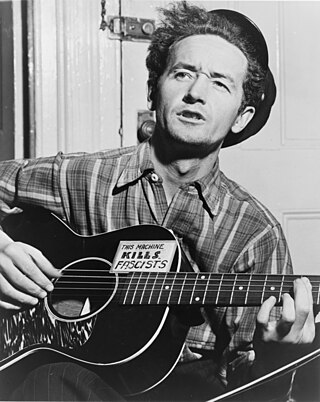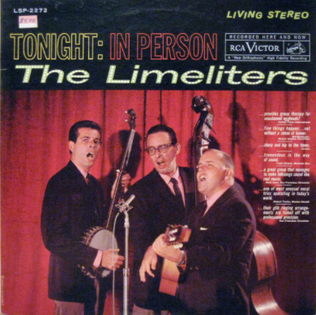
The Kingston Trio is an American folk and pop music group that helped launch the folk revival of the late 1950s to the late 1960s. The group started as a San Francisco Bay Area nightclub act with an original lineup of Dave Guard, Bob Shane, and Nick Reynolds. It rose to international popularity fueled by unprecedented sales of LP records and helped alter the direction of popular music in the U.S.
Westron Wynde is an early 16th-century song whose tune was used as the basis of Masses by English composers John Taverner, Christopher Tye and John Sheppard. The tune first appears with words in a partbook of around 1530, catalogued by the British Library as Royal Appendix MS 58. Historians believe that the lyrics are a few hundred years older and the words are a fragment of medieval poetry.

Glenn Robertson Yarbrough was an American folk singer and guitarist. He was the lead singer (tenor) with the Limeliters from 1959 to 1963 and also had a prolific solo career. Yarbrough had a restlessness and dissatisfaction with the music industry which led him to question his priorities, later focusing on sailing and the setting up of a school for orphans.

The Limeliters are an American folk music group, formed in July 1959 by Lou Gottlieb, Alex Hassilev (banjo/baritone), and Glenn Yarbrough (guitar/tenor). The group was active from 1959 until 1965, and then after a hiatus of sixteen years, Yarbrough, Hassilev, and Gottlieb reunited and began performing again as The Limeliters in reunion tours. On a regular basis a continuation of The Limeliters group is still active and performing. Gottlieb died in 1996, Yarbrough died in 2016, and Hassilev, the last founding member, who had remained active in the group, retired in 2006, leaving the group to carry on without any of the original members.
Donald David Guard was an American folk singer, songwriter, arranger and recording artist. Along with Nick Reynolds and Bob Shane, he was one of the founding members of The Kingston Trio.
Louis Gottlieb credited as Lou Gottlieb, was an American bassist and comic spokesman for music trio The Limeliters. He held a PhD in musicology and was considered one of the so-called "new comedy" performers, a new generation of unabashed intellectuals that also included Mort Sahl, Nichols and May, and Lenny Bruce. In 1966 he established the Morningstar Ranch, a community that he declared open to all people and which later became central to a legal dispute related to the ethics of ownership of land.

The American folk music revival began during the 1940s and peaked in popularity in the mid-1960s. Its roots went earlier, and performers like Josh White, Burl Ives, Woody Guthrie, Lead Belly, Big Bill Broonzy, Richard Dyer-Bennet, Oscar Brand, Jean Ritchie, John Jacob Niles, Susan Reed, Paul Robeson, Bessie Smith, Ma Rainey and Cisco Houston had enjoyed a limited general popularity in the 1930s and 1940s. The revival brought forward styles of American folk music that had in earlier times contributed to the development of country and western, blues, jazz, and rock and roll music.
The Ash Grove was a folk music club located at 8162 Melrose Avenue in Los Angeles, California, United States, founded in 1958 by Ed Pearl and named after the Welsh folk song, "The Ash Grove."

The Zodiac: Cosmic Sounds is a 1967 collaborative concept album on the theme of the signs of the Zodiac. It was issued by Elektra Records in and featured early use of the Moog synthesizer by Paul Beaver, with music written by Mort Garson, words by Jacques Wilson, and narration by Cyrus Faryar. Instrumentation was provided by members of the Wrecking Crew studio collective. It has been variously described as "a wonderful period piece" and "apt to inspire more giggle fits than stoned, pull-the-shades-down reveries".

The Be Good Tanyas are a Canadian folk music group formed in Vancouver in 1999. Their influences include folk, country, and bluegrass. The style of music they perform can be referred to as alt-country or Americana.

The Limeliters Reunion, Vol. 2 is an album released by The Limeliters in 1976 on Brass Dolphin LP record 2202. Recorded live on September 28, 1976 in the Seattle Opera House, the album documents one of the yearly reunion concerts given by the Limeliters in that decade. Vol. 1 contained new material, whereas this album was a tribute to the “folk mania” of the 1960s.

Winston Aubrey Aladar deBalkan Marshall is a British musician. He is best known as the former banjoist and lead guitarist of the folk rock band Mumford & Sons. Prior to this he was in the bluegrass sleaze rap group Captain Kick and the Cowboy Ramblers. With Mumford & Sons, Marshall won multiple awards, including a Grammy and two Brit Awards. He has performed music with different supergroups and collaborated with Baaba Maal and HVOB. After leaving Mumford & Sons, Marshall started an interview podcast with The Spectator.

William Zorn is an American folk music singer, banjo player, and guitarist who was a member of The New Christy Minstrels, The Limeliters, and The Kingston Trio, as well as lesser known groups The Windjammers and Arizona Smoke Review.

Tonight: In Person is a live album by the American folk music group, The Limeliters, a trio made up of Lou Gottlieb, Alex Hassilev, and Glenn Yarbrough. It was recorded live on July 29, 1960, in Hollywood, California, at the Ash Grove, a former Melrose Avenue furniture factory converted into a folk music club. The album was released in January 1961 on the RCA Victor label. It was the group's first album for RCA Victor.

The Limeliters is a studio album by the American folk music group, The Limeliters, a trio made up of Lou Gottlieb, Alex Hassilev, and Glenn Yarbrough. It was released in 1960 on the Elektra label. It was the group's first album and its only album for Elektra.

The Slightly Fabulous Limeliters is a live album by the American folk music group, The Limeliters, a trio made up of Lou Gottlieb, Alex Hassilev, and Glenn Yarbrough.It was recorded in Berkeley, California and released in 1961 on the RCA Victor label.

Sing Out! is a studio album by the American folk music group, The Limeliters, a trio made up of Lou Gottlieb, Alex Hassilev, and Glenn Yarbrough. The album was recorded in studio at RCA Victor's Music Center Of The World. It was released in 1962 on the RCA Victor label.

Through Children's Eyes is a live album by the American folk music group, The Limeliters, backed by a chorus of 70 children from the Berkeley Unified School District in California. The album was recorded on 29 December 1961 at the Berkeley Community Theater, Berkeley, California as a "benefit for the Music Department of the Berkeley school system, as well as an opportunity to record The Limeliters in unusual and delightful circumstances." It was released in 1962 on the RCA Victor label. Each of the original members of the group cited the album as their most satisfying. On the liner notes of the album, Gottlieb said: "I cannot tell you what a kick it was to sing with those children...The sound of their voices was - and I know this seems corny but it is true - simply an inspiration to us."

Folk Matinee is a studio album by the American folk music group, The Limeliters, a trio made up of Lou Gottlieb, Alex Hassilev, and Glenn Yarbrough. It was released in 1962 on the RCA Victor label.

Our Men in San Francisco is a live album by the American folk music group, The Limeliters, a trio made up of Lou Gottlieb, Alex Hassilev, and Glenn Yarbrough. It was recorded at a live performance at the Hungry I nightclub in San Francisco. It was released in 1963 on the RCA Victor label.
















